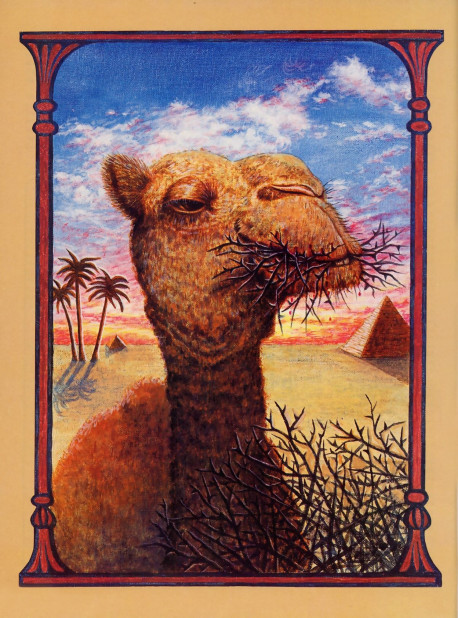“No creature smarts so little as a fool.”—Alexander Pope
by Dravida dasa
Dumb. That’s the only word for the camel, who often feasts on thorny bushes, mangles his mouth-and enjoys the taste of his own fresh blood. Never mind the pain and self-mutilation: it’s the taste that counts.
Sure our camel is dumb—but not much dumber than humans who act much the same way. Take the two-pack-a-day cigarette smoker, for example. He’s got a hacking cough, his doctor’s told him he has to stop, even the very pack of cigarettes he’s holding in his hand warns him that cigarette smoking is dangerous to his health. In short, he’s killing himself, and he knows it. But light up he does—smoke after smoke, pack after pack.
Or take your all-American swinging bachelor, enjoying as much sex as he can get. It probably never occurs to him that with each sexual encounter he’s sapping his vital energy. (In India, yogis have known for millenniums that sexual restraint increases mental powers and resistance to disease.) Then again, it’s hard to believe our jolly philanderer hasn’t felt at least a twinge of anxiety about contracting herpes, the epidemic and incurable venereal disease, or felt the pain of loneliness that comes from having sex with everyone but loving no one. Still, he can’t stop hurting himself in the name of pleasure.
Then we have the compulsive gambler. Nothing matters to him but being “in the action.” He’ll take out a second mortgage on his house or go into debt to loan sharks just to get money to gamble. He may lose his job or destroy his family—but he must gamble.
Finally, there’s your everyday enjoyer of hamburgers, medium-rare steaks, spaghetti and meatballs, bacon and eggs, pancakes with sausages, tender lamb chops, and so on. Eating meat at every meal is not only a pleasure for him but a measure of his success. But then come those unsettling reports from the National Academy of Sciences that there’s definitely a connection between meat-eating and cancer. And if our meat-lover is a little sensitive, it might occur to him that when he could live perfectly well, and much healthier, on milk products, grains, vegetables, fruits, nuts, and so on, there’s something wrong with a way of eating that contributes to the torture and slaughter of billions of animals every year. Maybe there is something like a karmic reaction that he’ll have to suffer for eating all that meat. But forget the dangers, forget the karma—that Big Mac sure looks good!
Intoxication, sexual looseness, gambling, meat-eating. The philosophy of Krsna consciousness enjoins its followers to give up these self-destructive activities as soon as possible. Not only do they corrupt the body and mind, bringing suffering now and later on in life, but they also block spiritual development, bringing lifetimes of suffering in the cycle of repeated birth, old age, disease, and death. As the Srimad-Bhagavatam, a devotional classic, explains, “Everyone will be attracted to hear Lord Krsna’s teachings and His glorious pastimes—except those who are killing themselves through sinful activity.”
The problem, of course, is that even if we understand the need to give up smoking, eating meat, and so on, we can’t. We’re too addicted -physically, psychologically, culturally—to make such a radical change in the way we live. Of course many people do give up one or two of these things when they realize how harmful they are, but hardly anyone gives them all up, and all four of them are extremely detrimental to body, mind, and spirit.
But for those of us who really want to cure all our material addictions—for good—Krsna consciousness can tell us how. In the Bhagavad-gita (2.59) Lord Krsna gives the solution in a nutshell: “Although the embodied living being [that’s us] may restrain himself from sense enjoyment, the taste for sense objects remains. But ceasing such engagements by experiencing a higher taste, he is fixed in consciousness.” Trying to give up powerful addictions by will power alone is almost always futile. But if we can get a “higher taste,” it becomes easy. We get that higher taste when we come in touch with Krsna. In other words, the transcendental pleasure of Krsna consciousness cures our addiction to lower pleasures.
Out of His mercy, Krsna makes Himself available to us in many ways so that we can get in touch with Him. The first and foremost is through His holy names. When we chant the holy names of God, as in the Hare Krsna mantra—Hare Krsna, Hare Krsna, Krsna Krsna, Hare Hare/ Hare Rama, Hare Rama, Rama Rama, Hare Hare—we come directly in contact with Krsna through transcendental sound. Krsna’s name is nondifferent from Krsna Himself, and since Krsna is all-attractive, He draws our mind and heart to Him when we chant His names sincerely. Many a Hare Krsna devotee can tell you how he tried to give up drugs, say, before becoming a devotee, but only after starting to chant Hare Krsna and serve the Lord was he able to do it—effortlessly.
Another way Krsna makes Himself available to us is through prasadam, vegetarian food cooked for and offered to Krsna with devotion. The endless variety of delicious preparations we can cook for Krsna make giving up meat a snap.
And gambling and free sex also fall by the wayside when we take up Krsna consciousness. It becomes obvious that there’s just no percentage in them.
So the choice is ours: Either we can continue living like the camel, whipping our senses with sinful activities and trying to enjoy the taste of our own blood, or we can give up our addiction to lower pleasures by getting the higher taste of Krsna consciousness, which continues eternally. I think we’d all agree that chewing on thorns may be okay for the camel—after all, he’s just a dumb animal—but it’s not where a man belongs.


Leave a Reply